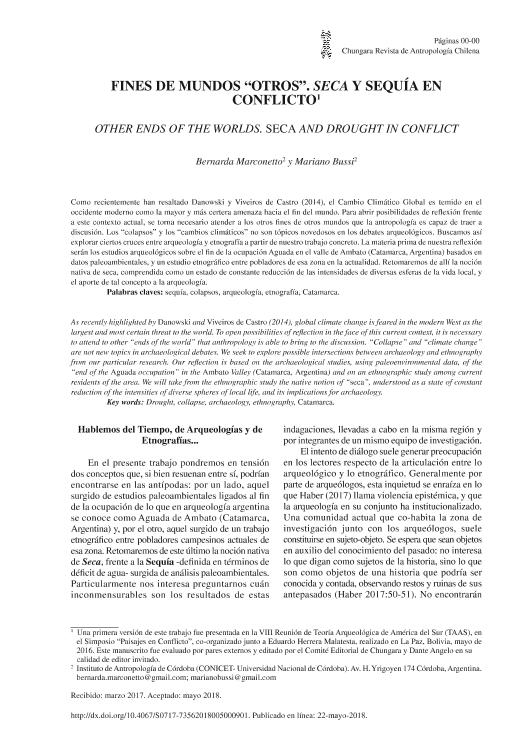Mostrar el registro sencillo del ítem
dc.contributor.author
Marconetto, María Bernarda

dc.contributor.author
Bussi, Mariano

dc.date.available
2019-11-21T17:15:05Z
dc.date.issued
2018-06-22
dc.identifier.citation
Marconetto, María Bernarda; Bussi, Mariano; Fines de mundo "otros". Seca y Sequía en conflicto; Universidad de Tarapaca; Chungara; 50; 2; 22-6-2018; 319-329
dc.identifier.issn
0716-1182
dc.identifier.uri
http://hdl.handle.net/11336/89428
dc.description.abstract
Como recientemente han resaltado Danowski y Viveiros de Castro (2014), el Cambio Climático Global es temido en el occidente moderno como la mayor y más certera amenaza hacia el fin del mundo. Para abrir posibilidades de reflexión frente a este contexto actual, se torna necesario atender a los otros fines de otros mundos que la antropología es capaz de traer a discusión. Los colapsos y los cambios climáticos no son tópicos novedosos en los debates arqueológicos. Buscamos así explorar ciertos cruces entre arqueología y etnografía a partir de nuestro trabajo concreto. La materia prima de nuestra reflexión serán los estudios arqueológicos sobre el fin de la ocupación Aguada en el valle de Ambato (Catamarca, Argentina) basados en datos paleoambientales, y un estudio etnográfico entre pobladores de esa zona en la actualidad. Retomaremos de allí la noción nativa de seca, comprendida como un estado de constante reducción de las intensidades de diversas esferas de la vida local, y el aporte de tal concepto a la arqueología.
dc.description.abstract
As recently highlighted by Danowski and Viveiros de Castro (2014), global climate change is feared in the modern West as the largest and most certain threat to the world. To open possibilities of reflection in the face of this current context, it is necessary to attend to other “ends of the world” that anthropology is able to bring to the discussion. “Collapse” and “climate change” are not new topics in archaeological debates. We seek to explore possible intersections between archaeology and ethnography from our particular research. Our reflection is based on the archaeological studies, using paleoenvironmental data, of the “end of the Aguada occupation” in the Ambato Valley (Catamarca, Argentina) and on an ethnographic study among current residents of the area. We will take from the ethnographic study the native notion of “seca”, understood as a state of constant reduction of the intensities of diverse spheres of local life, and its implications for archaeology.
dc.format
application/pdf
dc.language.iso
spa
dc.publisher
Universidad de Tarapaca
dc.rights
info:eu-repo/semantics/openAccess
dc.rights.uri
https://creativecommons.org/licenses/by-nc-sa/2.5/ar/
dc.subject
ARCHAEOLOGY
dc.subject
CATAMARCA
dc.subject
COLLAPSE
dc.subject
DROUGHT
dc.subject
ETHNOGRAPHY
dc.subject.classification
Antropología, Etnología

dc.subject.classification
Sociología

dc.subject.classification
CIENCIAS SOCIALES

dc.subject.classification
Otras Humanidades

dc.subject.classification
Otras Humanidades

dc.subject.classification
HUMANIDADES

dc.title
Fines de mundo "otros". Seca y Sequía en conflicto
dc.title
Other ends of the worlds. Seca and drought in conflict
dc.type
info:eu-repo/semantics/article
dc.type
info:ar-repo/semantics/artículo
dc.type
info:eu-repo/semantics/publishedVersion
dc.date.updated
2019-10-21T19:12:33Z
dc.identifier.eissn
0717-7356
dc.journal.volume
50
dc.journal.number
2
dc.journal.pagination
319-329
dc.journal.pais
Chile

dc.journal.ciudad
Arica
dc.description.fil
Fil: Marconetto, María Bernarda. Consejo Nacional de Investigaciones Científicas y Técnicas. Centro Científico Tecnológico Conicet - Córdoba. Instituto de Antropología de Córdoba. Universidad Nacional de Córdoba. Facultad de Filosofía y Humanidades. Instituto de Antropología de Córdoba; Argentina
dc.description.fil
Fil: Bussi, Mariano. Consejo Nacional de Investigaciones Científicas y Técnicas. Centro Científico Tecnológico Conicet - Córdoba. Instituto de Antropología de Córdoba. Universidad Nacional de Córdoba. Facultad de Filosofía y Humanidades. Instituto de Antropología de Córdoba; Argentina
dc.journal.title
Chungara
dc.relation.alternativeid
info:eu-repo/semantics/altIdentifier/url/https://scielo.conicyt.cl/scielo.php?script=sci_arttext&pid=S0717-73562018000200319
dc.relation.alternativeid
info:eu-repo/semantics/altIdentifier/doi/http://dx.doi.org/10.4067/S0717-73562018005000901
Archivos asociados
